 |
Traditionalist Issues
The Two Spirits
Lyle J. Arnold, Jr.
When young Benedictus of Nursia saw the corruption of the institutional Church and the decadence of Roman civilization in the 6th century, he had a holy fear of the danger of living in such a world. He fled the temptations of Rome, finding his sanctuary in a cave near the waters of the Anio. He lived there for three years. During that time, God instructed him as to his vocation: to build Catholic Europe by introducing Western monasticism. St. Benedict's Rule and the Order it begot, led the way to Clovis and the Merovingian dynasty, then Emperor Charlemagne and Christendom.
This age is rightly called The Age of Faith, and it formed a zeitgeist [spirit of the age] and ethos [moral environment] unrivaled in marvel by anything before or since. A medieval verse gives life to exactly what the spirit of that age was:
"God hath shapen lives three; boor and knight and priest they be." (1)

Peasants harvest the fields, with the protection of the castle in sight
Les Tres Belles Heures du Duc de Berry |
This refers to the three orders, those who work, pray and fight - the peasants, the clergy and the nobles.
Further, the author notes:
“If it was so ordained, so be it. The function of the peasantry was to serve the clergy and the nobles, and few questioned its rightness “(2).
A great historian, in writing about the lot of the peasantry, stated:
"A moral tie attached him to the family of his master, to the castle whose old towers protected him as they had protected his fathers; to the church at whose door he had assumed all the dignity of a man and of a Christian, and which offered him an inviolable asylum against the powers of the world. Around him all was animated. His habits, his labors, his privations, his perils were all connected with ideas in which he had faith and for which he would have gladly died... There was then a unity of feeling, and even of taste, and a community of enjoyments among the high and the low.” (3)
This spirit is in direct conflict with the new spirit of Progressivism, which is alive at the zenith of our Hierarchy, and has flowed down through all levels, from religious, priests, ending with the laity. Cardinal Suenens approvingly declared that "Vatican II is the French Revolution of the Church.'" (4) Pope Benedict XVI, when he was a Cardinal, noted that Gaudium et spes "represents on the part of the Church, an attempt at official reconciliation with the new era inaugurated in 1789." (5)
This new era intended to finish with Christian Civilization and its soul, the Church, forever. The spirit of Christendom, then, is a pole apart from the spirit of Vatican II, and wars against it.

In 1789 the three orders forging the new revolutionary constitution on an anvil
Bibliotheque Nationale, Paris |
Keeping in mind these two spirits, there is a simple test that will determine which of them a given person has. A person with the spirit of Christendom will marvel at the humility and, therefore, the profound recognition of truth spoken in the words quoted above, "God hath shapen lives three."
The progressivist spirit will find in it "a measure difficult and violent." He or she, perhaps long ago, gave in to the temptation of Voltaire, an enemy of the Church and order of Christendom.. Perhaps at the first instant.
In speaking about the beginning of temptations, Our Lady spoke to Venerable Mary of Agreda about the temptation of Lucifer after God revealed himself more clearly to the angelic realm after its creation. Here is what was reported:
"At first they received a more explicit intelligence of the being of God, one in substance, trine in person, and that they were commanded to adore and reverence Him as their Creator and highest Lord, infinite in his essence and attributes. All subjected themselves to this command and obeyed it, but with a certain difference. The good Angels obeyed through love and on account of the justice of it, offering their love and good will, freely admitting and believing what was above their intelligence, and obeying with joy.
“Lucifer, on the other hand, submitted himself, because the opposite seemed to him impossible. He did not do it with perfect charity, for he, as it were, was divided in his will between himself and the infallible truth of the Lord. As a consequence, it happened that the precept appeared to him in a measure difficult and violent, and his fulfilling of it was wanting in love and the desire to do justice. Thus he exposed himself beforehand to the danger of not persevering.” (6)
When a progressivist turns his thoughts to social order, he invariably chooses the Modern State, which Aristotle described as "rule by the undisciplined and unvirtuous." (7) Horribile dictum [what horrible words] … for when this choice is made, it forms the soul. This is a metaphysical error, not merely a political one. (8) Like the Faith itself, the conditions for acceptance or rejection are spiritual. Medieval society was the closest ever to a perfect society, serving the common good in matters spiritual and temporal. When the Revolution led to the decadence of the Middle Ages, it prepared the soil successively for Luther, Robespierre, Stalin, Hitler, Pol Pot and proletarian absolutism, with its sequel of homosexual acceptance and abortion.
In what purports to be the Catholic Church, this progressivist spirit rejects the proper order of society because it rejects hierarchy in principle. Its creed is the revolutionary liberty, equality, fraternity, made graphically clear by the words above of the two Cardinals.
May Our Lady swell the ranks of the Catholic counter-revolutionary remnant, who fight in the unbloody war unleashed by Progressivism for the return to Christian Civilization.
Footnotes:
1. Anne Fremantle, Age of Faith, NY:Time, Inc, 1965, p. 16.
2. Ibid.
3. K. Digby apud E. Cahill, The Framework of a Christian State, Fort Collins, CO: Roman Catholic Books, 1931, p. 67.
4. Leo Joseph Suenens apud Paul Kramer, The Devil's Final Battle, Terryville, CT: The Missionary Assn, 2002, pp. 64-65,
5. Joseph Ratzinger, Principles of Catholic Theology, p. 38, apud ibid.
6. Mary of Agreda, Mystical City of God, Wn/NJ: Ave Maria Institute, 1949, vol. 1, pp. 88-89.
7. Crane Brinton, Ideas of Men, NJ: Englewood Cliffs, 1963; St. Thomas Aquinas, On the Governance of Rulers, Toronto 1935.
8. Metaphysics deals with speculative philosophy. In the Catholic sense this is the Thomistic method, reason illuminated by Faith. Because the social order redounds to all the endeavors of man, to fix a false premise on the nature of that order is to welcome all that will come from "the world-rulers of this darkness" (Eph. 6:12).

Posted June 14, 2007

Related Topics of Interest
 Revolution and Counter-Revolution - Overview Revolution and Counter-Revolution - Overview
 The War of the Two Elites The War of the Two Elites
 The Abomination of Desolution The Abomination of Desolution
 Inadmissable Concessions, Once Again Inadmissable Concessions, Once Again
 Liberalism, Modernism and Progressivism Liberalism, Modernism and Progressivism
 Conservatives, Traditionalists, and Counter-Revolutionaries Conservatives, Traditionalists, and Counter-Revolutionaries

Related Works of Interest
|
Traditionalism | Hot Topics | Home | Books | CDs | Search | Contact Us | Donate

© 2002- Tradition in Action, Inc. All Rights
Reserved
|
 |
|